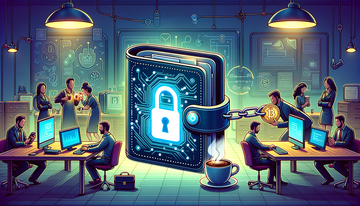Hey there, crypto enthusiasts! We all love our morning routines, don't we? Whether it's that perfectly brewed cup of coffee or catching up on the latest crypto news—some things just never change. But, have you ever thought about your crypto wallet PIN code with the same amount of care? It might sound a bit odd, but that little sequence of digits is holding the key to your digital treasures. So, why not give it some extra love and attention?
What's the Big Deal About a Little Code?
You might be thinking, 'It's just a PIN, how important could it be?' Well, let's dig into that for a moment. Your PIN code is essentially the first line of defense against unauthorized access to your crypto assets. It's your own personal gatekeeper. Imagine someone snooping on your investments while you're left high and dry—it sounds like a nightmare, right?
Whether you're using a Trezor or Ledger wallet, these hardware wallets rely on a secure PIN to function. In fact, if you lose or forget this little number, you'll definitely be in a tight spot. It’s not as simple as resetting a social media password; it requires a whole different level of authentication.
Why Complexity is Key
Let’s talk numbers. Sure, you could go with '1234'—it's easy to remember, but also incredibly risky. If your PIN is simple, anyone with an ounce of guesswork can crack it. Think of it this way: a weak PIN is like leaving your front door unlocked with a sign that says, 'Come on in!' Would you do that? Probably not.
Creating a complex PIN isn't just responsible, it’s downright essential. Use a mix of numbers that don't follow any clear pattern. Avoid birthdays, anniversaries, or anything connected to your personal life. Also, don’t make it too long that even you can’t remember it; finding the sweet spot is key.
Is Changing It Really Necessary?
Here's the thing: even the strongest structures need maintenance. Just like how you’d update the software on your devices, updating your crypto wallet PIN annually (or more often) can thwart potential breaches. But don't fret about having to remember dozens of codes; just keep a secure backup of each one you create!
How to Keep It Safe
- Write it down and store it in a personal safe—far from prying eyes.
- Use a secure digital password manager.
- Refrain from sharing it, even with those you trust implicitly.
You see, being paranoid here can actually pay off. It’s like realizing that clock you thought didn’t matter was actually ticking towards something important.
The Emotional Connection (Because It's Real)
It's funny how we often form emotional connections with our belongings, right? Ever felt panic when you can't find your phone for a few minutes? The same (or more) should apply to your crypto assets. Your PIN might just be numbers, but it holds emotional weight. It represents trust, security, and peace of mind. Imagine the relief you'll feel knowing your digital currency is safe and sound. Isn’t that worth the effort?
Don’t Overthink It…But Do
Now, I'm not saying to over-engineer the process or lose sleep over it. Yet, it's worth a few moments of thought. Ask yourself: Is my current PIN really safe? What if someone guessed it? Would I remember it during an emergency?
Investing time in reconsidering your crypto wallet's security could save you from potential headaches later. Just like you're fond of checking crypto prices, make routine PIN assessments a part of your ritual. Trust me, it'll pay off.
In the realm of digital finance, understanding the importance of your crypto wallet PIN code is crucial. A few numbers can hold the fate of your financial security. It might seem trivial, but so does that coffee until you're halfway through your day without it, right? Now, go ahead—give your PIN code the love and care it truly deserves!











